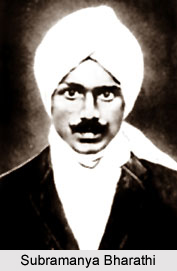 Subramanya Bharathi was known as Mahakavi Bharathiyar. Bharathi was a prolific writer in poetry and prose forms. He is among one of the early Independent poets and played a major role in revolutionizing the Independence movement initially in Tamil Nadu. He is known for his simple use of the language.
Subramanya Bharathi was known as Mahakavi Bharathiyar. Bharathi was a prolific writer in poetry and prose forms. He is among one of the early Independent poets and played a major role in revolutionizing the Independence movement initially in Tamil Nadu. He is known for his simple use of the language.
His parents were Chinnasami Subramanya Iyer and Elakkumi whom he lost his parents at a young age He was educated at a local high school in Tirunelveli and learned music at a young age. He was invited to a conference that comprised of Ettayapuram court poets and musicians where he was conferred the title of Bharathi. He was married to his cousin Chellamal. After his early marriage he left for Varanasi in 1898. While staying in Benaras he learned a lot about Hindu spirituality and nationalism that broadened his outlook.
While he was coming back home, he met Sister Nivedita, Swami Vivekananda`s spiritual daughter and she left an overwhelming influence on Subramanya. He became the Assistant Editor of the Tamil daily Swadeshamitran in 1904. After three years he started editing the Tamil weekly India and the English newspaper Bala Bharatham along with M.P.T. Acharya. Through these newspapers he expressed his creativity by the means of his poems which were published regularly in these publications. He wrote religious hymns to nationalistic writings, contemplations on the relationship between God and Manto songs on the Russian and French revolutions. He was also against society for meting out bad treatment to the downtrodden people as well as the British for occupying India.
His poems expressed a progressive ideal. His imagery symbolise Tamil culture in many ways. He supported greater rights for women. He also fought against the caste system that was prevalent in Hindu society. He was struck by an elephant at Parthasarathy temple, Triplicane, Chennai, whom he used to feed. Despite surviving it, he died a few months later on September 12, 1921.
In 1908 he fled to Puducherry which was then under French rule to eschew British Government. In Puducherry he started publishing weekly journal India, Vijaya, a Tamil daily, Bala Bharatha, English monthly, and Suryothayam a local weekly of Puducherry. Both India and Vijaya were banned in British India in 1909. In this time he came into contact with Lala Lajpat Rai and V.V.S. Aiyar and Aurobindo Ghosh .He helped Aurobindo to bring out Arya and Karma Yogi Journal .He was arrested near cuddalore in 1918 and he was imprisoned for three weeks. Bharathi also met Mahatma Gandhi in 1919.
He wrote mainly three types poems-nationalistic poem, religious and philosophical poems and poems about nature. His nationalistic poem had great impact on the Freedom fighters. He penned several devotional poems like kannan Paattu (The Song of Krishna). He was deeply moved by Shelley and wrote Kuyil Paatu (Song of The Cuckoo), to pay tribute to the great nature poet Shelley. Bharathi also published Panchali Sapatham , a semi-political reflection on greed, pride and righteousness taken from the Indian epic Mahabharata. Bharathi introduced a new style in Tamil poetry. Before him Tamil poetry followed syntactic rules given by the ancient Tamil grammatical masters Tolkappiyam. He brought a relatively modern style called the Puthukkavithai. It was a mixed version of prose and poetry.
He wrote several short and long, essays, prose-poetry and fiction. He followed both the rules of Tamil literature and his new style of puthukkavithai. His literary works can be classified as Autobiography, Patriotic songs ,Philosophical songs , Miscellaneous songs, Devotional songs Commentary on Gita, Kannan song, Kuyil song, Panchali`s Vow. Chandrika`s story , Pappa Pattu (Songs for the Children) and Leaders .
He also made his mark as a music composer. Most of his songs were based on nationalism. In harata Dheviyin Thiru Dasangam he mixed ten different ragas. He wrote only two songs in Sanskrit language. Some of his popular songs include: Theeratha Vilaiyattu Pillai, Chinnanchiru Kiliye, Suttum Vizhi, Thikku Theriyaatha, Senthamizh Nadenum and Paarukkule Nalla Naadu.













